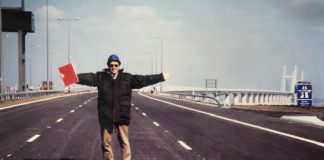- Don’t let it be again part two - 15th July 2025
- Best of enemies part two - 14th July 2025
- Childish politics - 11th July 2025

During a 40 year career, for our Editor Phil Parry protests (as we are seeing today) have always been a mainstay of his journalism (many of them in Wales), so here he looks back at what has happened.
Sometimes as a reporter you are a witness to illegal activity.
This has been underlined by the protests today by extremist thugs.

Courts are preparing to sit late into the night, and at weekends to deal with the violence. The right-wing activist Tommy Robinson has been encouraging them using social media.
Many of the protesters have taken offence at the claim that they are members of the far right, and to chants of “Nazi scum” from counter-protesters.
 On the other hand shouts of “Muhammad is a paedo” and “Oh, Tommy Robinson” from their own side at one demo, would seem to undermine that professed innocence. Mr Robinson has repeatedly spread the ‘Great Replacement’ conspiracy theory claiming that Muslims are being brought into Western countries to outbreed and ‘replace’ whites, and that too, seems to fly in the face of what we are being told.
On the other hand shouts of “Muhammad is a paedo” and “Oh, Tommy Robinson” from their own side at one demo, would seem to undermine that professed innocence. Mr Robinson has repeatedly spread the ‘Great Replacement’ conspiracy theory claiming that Muslims are being brought into Western countries to outbreed and ‘replace’ whites, and that too, seems to fly in the face of what we are being told.
But these riots are nothing new, although the causes are different, and the perpetrators might come from the other end of the political spectrum.
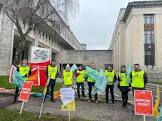
I remember very well filming in the 1980s for a report on BBC Cymru Wales Today (WT), demonstrators illegally daubing slogans on (what was then) the Welsh Office (WO) calling for a second Welsh language act.
Celebrities suddenly peeled away from a lawful demonstration to engage in what was criminal behaviour, watched by senior politicians.
I didn’t know this would happen, but I think my bosses had been tipped off (and might, therefore, have been charged with possessing knowledge of the kind of criminal behaviour we have seen in Sunderland as well as elsewhere) – I was sent along, yet some of the protesters refused to do interviews in English.
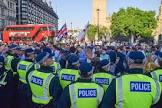
Ultimately these people were successful (although I do not condone this action) and a new act was passed years later, with the Welsh Language Act 1993 forming the Welsh Language Board.
The act made it mandatory for public bodies in Wales to employ a Welsh language scheme for use of Welsh in services, after notification to do so from the board.
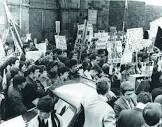
During my time as a journalist I have covered any number of protests, most of which (unlike the ones today) have been entirely lawful.
For news, a key detail would be to estimate the size of the demonstration, and the organisers would always OVERESTIMATE it, while the police would usually UNDERESTIMATE.
As a result you would invariably pick a figure somewhere in between.

 Indeed historically there has been a great tradition of rebellion in Wales and these often had noble roots, unlike the trouble today.
Indeed historically there has been a great tradition of rebellion in Wales and these often had noble roots, unlike the trouble today.
I remember during a live debate programme on BBC Cymru Radio Wales (RW) an audience member cried out: “WE ARE PROUD OF OUR REBELS!”.
Perhaps one of the most famous of these rebellions was The Rebecca (or Rebeca) Riots.
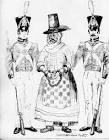
They were a series of protests that took place between 1839 and 1843, throughout the rural areas of West Wales, particularly Cardiganshire, Carmarthenshire and Pembrokeshire.
The protesters were mainly farming families who had been angered by unjust taxes, and more specifically by the high tolls being charged to transport goods and livestock along the roads and byways of the region.
All of this has been put centre stage today by what has happened after the killings in Southport, as well as by fresh revelations about protests (sometimes by individuals), before the abolition of slavery and afterwards during the so-called ‘apprenticeships’.
In 1807, the UK parliament passed the Abolition of the Slave Trade Act, which ended the buying and selling of enslaved people within the British Empire.
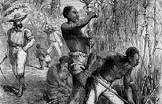
In 1838 The Masters and Servants Act (otherwise known as the ‘Contract Law’) replaced slave laws and were an improvement, but still not good enough.
It’s been shown now how black people protested bravely against the situation after slavery, because it meant that if they were deemed to be insubordinate by their ’employers’, they could be thrown off the plantation without compensation and punished terribly.

There have been awful scenes of disorder in Bristol too after the events in Southport, but that city has a long history of rioting.
These ones started in Castle Park with the right-wing lot on one side, and on the other a counter protest which was hundreds strong, and people chanting “fascists not welcome“, with the police describing as “absolutely outrageous” what then happened.

Yet, as elsewhere, this follows in a historical tradition – and some of the riots have been reactionary like this one.
At the New Cut riot of 1809 demonstrators were unhappy when the beer ran out during a celebratory dinner which included navvies who had worked on an artificial waterway.
A gallon of strong beer was served for each man, but when the liquid refreshment finished too soon, there was a mass brawl between English and Irish labourers and the ensuing riot had to be suppressed by a naval press gang.

So what is happening today should be put in its proper context, because there is nothing new in these riots – they are just coming from a different direction that’s all!
The memories of Phil’s decades-long award-winning career in journalism (when the Welsh Office [WO] protest erupted), as he was gripped by the rare disabling condition Hereditary Spastic Paraplegia (HSP), have been released in a major book ‘A GOOD STORY’. Order it now!

Regrettably publication of another book, however, was refused, because it was to have included names.
Tomorrow – more evidence has emerged of how hostile states are harnessing new technology, even as The Eye experience unprecedented levels of ‘hacking’ designed to monitor our investigations.









